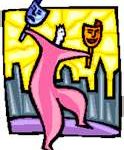COMPETENCIES AT WESLEYAN: Approaches to Consider in Your Plan of Study
Flexible Framework for Considering Competencies
While at Wesleyan, students engage in the deep study of an academic field once they have declared a major, and they develop academic breadth through their general education coursework. In addition, they will also build broad, interdisciplinary skills through all of their curricular, co-curricular, and extracurricular activities. Wesleyan has developed a flexible framework built on four competencies to allow students to engage voluntarily in a process of reflection (both in conjunction with advisors and on their own).
The four competencies:
- Mapping = navigating complex environments (NCE)
- Expressing = writing, expressing, communicating (WEC)
- Mining = quantitative analysis and interpretation (QAI)
- Engaging = negotiating intercultural differences (NID)
Mapping = Navigating Complex Environments (NCE)
Mapping is defined as the ability to examine the relationship of objects and spaces in the material and imagined worlds. It involves developing tools to create, manipulate, and navigate constructed and natural environments and charting movement through and interactions with space and its consequences.
Mapping courses may include courses across the curriculum, from the arts (e.g., dance, studio art, and art history), to the natural sciences and mathematics, as well as courses from interdisciplinary programs. Example skills include typography, computation, material science, modeling, and mapping.
Expressing = Writing, Expressing, Communicating (WEC)
Expressing is defined as the ability to express thoughts, ideas, and emotions to others effectively and concisely through a variety of media.
Expressing courses are principally but not solely in the humanities, arts, and social and behavioral sciences. These courses assign written, verbal, and creative projects, and performances that help students develop their ability to express thoughts and ideas to others.
Mining = Quantitative Analysis and Intepretation (QAI)
Mining is defined as the ability to use numerical ideas and methods to describe and analyze quantifiable phenomena. It involves learning about the measurement, analysis, summary, and presentation of information, including about the natural world, as well as answering questions, solving problems, making predictions, and testing and constructing theories by employing mathematical, statistical, logical, and scientific reasoning.
Mining courses are principally but not solely in mathematics, natural sciences, and social and behavioral sciences.
Engaging = Negotiating Intercultural Differences (NID)
Engaging is defined as the ability to comprehend and respect diverse cultural heritages and perspectives in relation to their wider historical and social contexts. It involves reading, speaking, or understanding a second or third language (contemporary or classical); gaining experience working, studying, or traveling abroad or in other unfamiliar cultural contexts; and participating in the political and social life of local and global communities.
Engaging courses may include courses across the curriculum, from language, literature, and culture courses, to courses in history, science in society, religion, government, and philosophy, among other areas.



 Russell, John Zorn, Julius Eastman and including discussions of recent work by composers, performers, and sound artists such as Pamela Z, Tristan Perich, Jacob Cooper, Lesley Flanigan, Nick Hallett, Jace Clayton (DJ /rupture), Jennifer Walshe, and Object Collection. The course includes lectures, demonstrations, and performances, occasionally by guest lecturers.
Russell, John Zorn, Julius Eastman and including discussions of recent work by composers, performers, and sound artists such as Pamela Z, Tristan Perich, Jacob Cooper, Lesley Flanigan, Nick Hallett, Jace Clayton (DJ /rupture), Jennifer Walshe, and Object Collection. The course includes lectures, demonstrations, and performances, occasionally by guest lecturers. ation (Book/Lyrics), The Unhappiness Plays, The Boring-est Poem in the World, The Truth About Santa, Pig Farm, Eat the Taste, Urinetown (Book/Lyrics, for which he won an Obie Award and two Tony® Awards), and Jobey and Katherine. His work has been produced and developed in theaters across the country and around the world, including Actors Theatre of Louisville, American Conservatory Theater, American Theater Company, Henry Miller’s Theatre, Manhattan Theatre Club, New York Stage and Film, Perseverance Theatre, Roundabout Theatre Company, Soho Rep, South Coast Rep, and The Old Globe, among others. Greg is a member of the Neo-Futurists, the Cardiff Giant Theater Company, ASCAP, the Dramatists Guild, and is a 2010-11 Lark Play Development Center Playwrights Workshop Fellow. He grew up in Wellfleet, Massachusetts and now lives in Brooklyn with his wife Ayun Halliday, his daughter India, and his son Milo.
ation (Book/Lyrics), The Unhappiness Plays, The Boring-est Poem in the World, The Truth About Santa, Pig Farm, Eat the Taste, Urinetown (Book/Lyrics, for which he won an Obie Award and two Tony® Awards), and Jobey and Katherine. His work has been produced and developed in theaters across the country and around the world, including Actors Theatre of Louisville, American Conservatory Theater, American Theater Company, Henry Miller’s Theatre, Manhattan Theatre Club, New York Stage and Film, Perseverance Theatre, Roundabout Theatre Company, Soho Rep, South Coast Rep, and The Old Globe, among others. Greg is a member of the Neo-Futurists, the Cardiff Giant Theater Company, ASCAP, the Dramatists Guild, and is a 2010-11 Lark Play Development Center Playwrights Workshop Fellow. He grew up in Wellfleet, Massachusetts and now lives in Brooklyn with his wife Ayun Halliday, his daughter India, and his son Milo. in any subject. A meaningful cross-cultural experience sharpens our understanding of ourselves in relation to the world in which we live. It is the best means for achieving the intercultural expertise and multilingualism that our students will need for exercising leadership in an increasingly interconnected world.
in any subject. A meaningful cross-cultural experience sharpens our understanding of ourselves in relation to the world in which we live. It is the best means for achieving the intercultural expertise and multilingualism that our students will need for exercising leadership in an increasingly interconnected world.